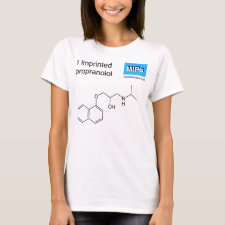
Authors: Kamra T, Xu CG, Montelius L, Schnadt J, Wijesundera SA, Yan MD, Ye L
Article Title: Photoconjugation of Molecularly Imprinted Polymer Nanoparticles for Surface-Enhanced Raman Detection of Propranolol.
Publication date: 2015
Journal: ACS Applied Materials & Interfaces
Volume: 7
Issue: (49)
Page numbers: 27479-27485.
DOI: 10.1021/acsami.5b09500
Abstract: We report a simple and versatile method to covalently immobilize molecularly imprinted polymer (MIP) nanoparticles on a Raman active substrate (Klarite) using a disulfide-derivatized perfluorophenylazide (PFPA-disulfide). Gold-coated Klarite was functionalized with PFPA-disulfide via a gold-sulfur bond. Upon light radiation, the available azido groups were converted to highly reactive singlet perfluorophenyl nitrene that undergoes a CH insertion reaction and form covalent bonds with the MIP nanoparticles. The resulting surfaces were characterized using scanning electron microscopy and surface enhanced Raman spectroscopy to study the morphology and template affinity of the surfaces, respectively. The Raman measurements clearly show a dose-responsive signal when propranolol binds to the MIP surface. Because the MIP particles were covalently attached to the Raman active substrate, the sensing surface was stable and could be reused after regeneration in acetic acid solution. The MIP-based Raman sensor was used successfully to detect propranolol in urine samples (7.7 x 10-4 M). Our results show that the high selectivity of MIPs and the fingerprint Raman identification can be integrated into a compact sensing unit using high-efficiency photoconjugation. Thus, the method proposed is reliable, efficient and fast for fabricating label-free chemical sensors
Template and target information: propranolol
Author keywords: Molecularly imprinted polymers, propranolol, perfluorophenylazide disulfide, Photocoupling, Klarite, Surface-enhanced Raman spectroscopy, urine



Join the Society for Molecular Imprinting

New items RSS feed
Sign-up for e-mail updates:
Choose between receiving an occasional newsletter or more frequent e-mail alerts.
Click here to go to the sign-up page.
Is your name elemental or peptidic? Enter your name and find out by clicking either of the buttons below!
Other products you may like:
 MIPdatabase
MIPdatabase









